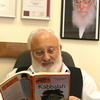What Is Pain, and How Can We Stop Feeling It All the Time?
 In our world, pain is the organism’s reaction to a problem in it. It’s the organism’s way of telling us that something is wrong with our body. For example, pain warns us of danger and makes us pull our hand away from fire. Pain compels us to move, to come closer to something/someone, or to get away from them, to change our qualities, to adopt new opinions, to realize the reason for the pain, to draw conclusions, and to progress to new states of being.
In our world, pain is the organism’s reaction to a problem in it. It’s the organism’s way of telling us that something is wrong with our body. For example, pain warns us of danger and makes us pull our hand away from fire. Pain compels us to move, to come closer to something/someone, or to get away from them, to change our qualities, to adopt new opinions, to realize the reason for the pain, to draw conclusions, and to progress to new states of being.
In fact, pain is the only force that is able to affect our egoism: pain when we feel bad, or when others feel bad, or when others feel good. Pain pushes us from behind and forces us to develop. The pain of feeling empty pushes us ahead, toward fulfillment. Pain is everywhere! All our sensations come from clashes, contact, pressure – or in other words, from pain. We feel pleasure only when it’s preceded by the painful sensation of an unfulfilled desire, suffering, or expectation.
However, when we come out of egoism and rise above the Machsom, we begin to realize that instead of living our lives based on lack or absence, we can live based on total fulfillment and fullness. Instead of basing everything on pain, we can take perfection as our starting point. Instead of doing the things we do because we need to, we can do them out of love, without needing anything.
This is a completely different kind of existence, a different attitude to the world, to people, to yourself, and of course – to the Creator. And when we attain it, the Creator immediately becomes revealed to us, because then we become perfect, just like Him.
Related Material:
Laitman.com Post: Kabbalah – For When Life Is Like Putting Out One Fire After Another
Laitman.com Post: Correct Yourself and Everything will Radiate Harmony
Laitman.com Post: The Fates of Great Kabbalists
Laitman.com Post: Turning Anger Into Progress
Article: Why Do I Feel Bad?









